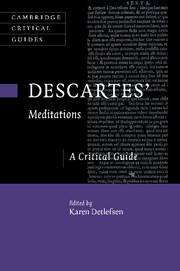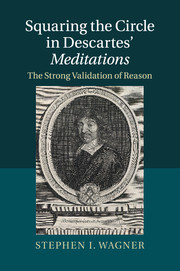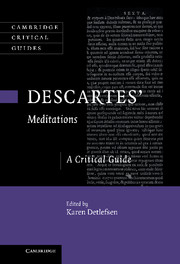The Cambridge Companion to Descartes’ Meditations
Descartes' enormously influential Meditations seeks to prove a number of theses: that God is a necessary existent; that our minds are equipped to track truth and avoid error; that the external world exists and provides us with information to preserve our embodiment; and that minds are immaterial substances. The work is a treasure-trove of views and arguments, but there are controversies about the details of the arguments and about how we are supposed to unpack the views themselves. This Companion offers a rich collection of new perspectives on the Meditations, showing how the work is structured literally as a meditation and how it fits into Descartes' larger philosophical system. Topics include Descartes' views on philosophical method, knowledge, skepticism, God, the nature of mind, free will, and the differences between reflective and embodied life. The volume will be valuable to those studying Descartes and early modern philosophy more generally.
- Includes two chapters on each of Descartes' six Meditations, thereby offering different interpretive approaches
- Highlights the way in which Descartes' Meditations is literally a meditation, progressing from the position that we occupy at the start of enquiry to a position that is more considered and more advanced
- Treats the material in each Meditation with an eye to Descartes' larger system, as well as discussing the views of the Meditations from a post-Meditations perspective
Product details
January 2014Hardback
9781107018600
340 pages
231 × 155 × 23 mm
0.62kg
Available
Table of Contents
- Introduction David Cunning
- 1. The methodology of the Meditations: tradition and innovation Christia Mercer
- 2. The First Meditation: skeptical doubt and certainty Charles Larmore
- 3. The First Meditation: divine omnipotence, necessary truths and the possibility of radical deception David Cunning
- 4. The Second Meditation and the nature of the human mind Lilli Alanen
- 5. The Second Meditation: unimaginable bodies and insensible minds Katherine J. Morris
- 6. The Third Meditation: causal arguments for God's existence Lawrence Nolan
- 7. The Third Meditation on objective being: representation and intentional content Amy Schmitter
- 8. The Fourth Meditation: Descartes's theodicy avant la lettre Thomas M. Lennon
- 9. The Fourth Meditation: Descartes and libertarian freedom Cecilia Wee
- 10. The Fifth Meditation: Descartes' doctrine of true and immutable natures Tad M. Schmaltz
- 11. The Fifth Meditation: externality and true and immutable natures Olli Koistinen
- 12. The Sixth Meditation: Descartes and the embodied self Deborah Brown
- 13. Sensory perception of bodies: Meditation 6.5 Alison Simmons
- 14. Descartes's dualism and its relation to Spinoza's metaphysics Alan Nelson
- 15. The Meditations and Descartes' considered conception of God Annette Baier.







